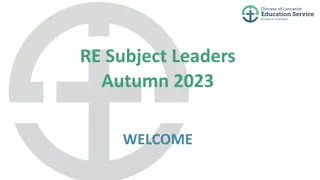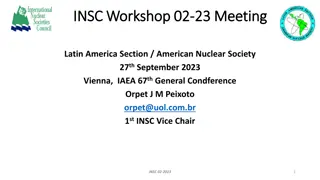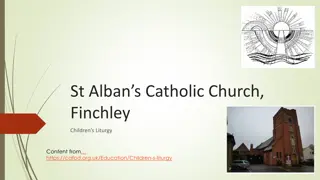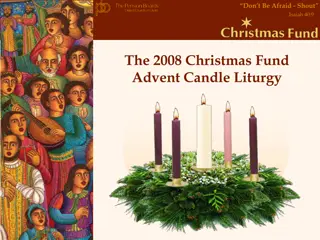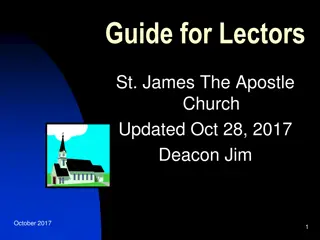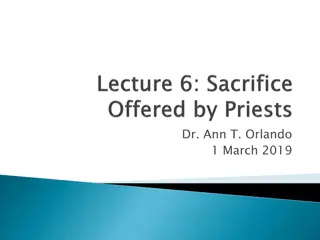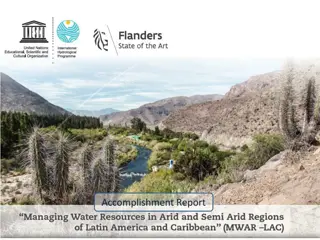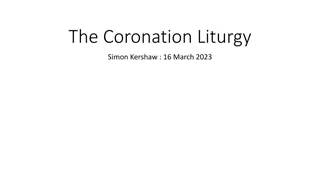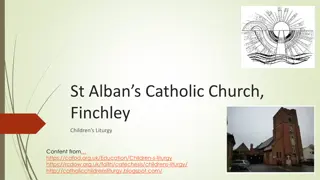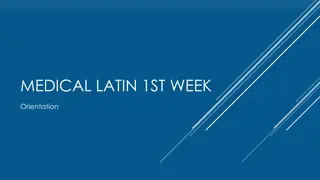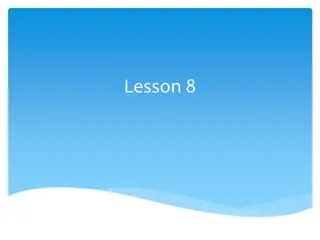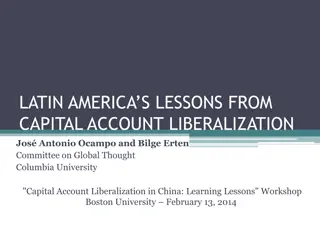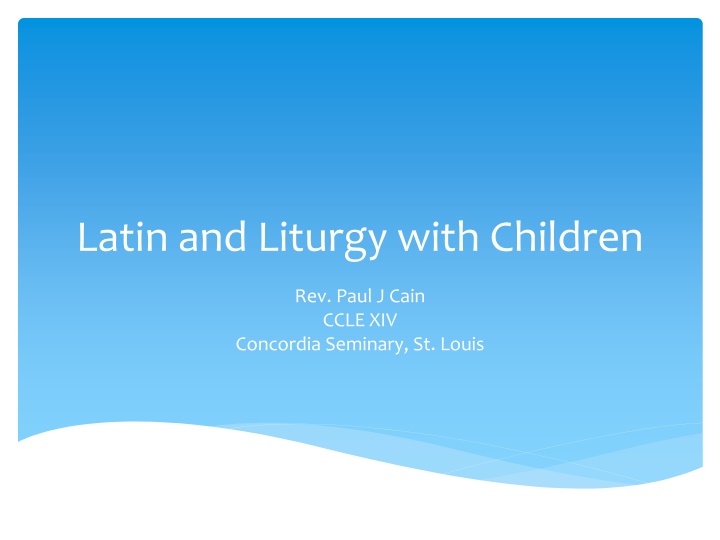
Latin Liturgy Children - Encouraging Christian Education
Explore the significance of incorporating Latin and Christian liturgy with children in educational settings. Discover the framework, benefits, and methods, emphasizing Lutheran Christian values and identity for a holistic educational experience.
Download Presentation

Please find below an Image/Link to download the presentation.
The content on the website is provided AS IS for your information and personal use only. It may not be sold, licensed, or shared on other websites without obtaining consent from the author. If you encounter any issues during the download, it is possible that the publisher has removed the file from their server.
You are allowed to download the files provided on this website for personal or commercial use, subject to the condition that they are used lawfully. All files are the property of their respective owners.
The content on the website is provided AS IS for your information and personal use only. It may not be sold, licensed, or shared on other websites without obtaining consent from the author.
E N D
Presentation Transcript
Latin and Liturgy with Children Rev. Paul J Cain CCLE XIV Concordia Seminary, St. Louis
Who? Your Pastor Headmaster All Teachers All Staff All Students
Where? Ideally, in your church, the nave. Sit in the pews. Have Pastor use the chancel/Sanctuary as on Sunday
What? The GRAMMAR of the Christian Faith The historic liturgy of the Church Faithful hymnody and song from every time and place Lutheran Service Book Luther s Small Catechism
Why? Children, obey your parents in the Lord, for this is right. Honor your father and mother (this is the first commandment with a promise), that it may go well with you and that you may live long in the land. Fathers, do not provoke your children to anger, but bring them up in the discipline and instruction of the Lord. (Ephesians 6:1-4) We are partners with Parents in Catechesis
When? Often. Daily (or most days a week) What if we only have weekly chapel now? How Long? 20-30 minutes is possible
How? That s why we re here today
Being just as good as the other educational options in town is not enough
Another Model Matins every day except Wednesday: Divine Service 3 Different Hymns every day
A Model: Martin Luther Grammar School Monday: Matins An Old Testament Lesson (or reading from Acts) Teach the Venite First Hymn options for canticles Te Deum Taught page by page Classroom review Benedictus for Advent and Lent
A Model: Martin Luther Grammar School Tuesday: Service of Prayer and Preaching Epistle sermon Both canticles have refrains Catechism Ten Commandments Creed Lord s Prayer For Lord, have mercy. Luther s Morning Prayer (and Evening Prayer)
A Model: Martin Luther Grammar School Wednesday: Morning Prayer Another Matins Sermon on the Holy Gospel More learnable by the young? Benedictus
A Model: Martin Luther Grammar School Thursday Afternoon: Evening Prayer (or Compline) Topical sermon or on Psalm or extra reading Prayed at the End of the School Day MLGS scholars favorite! Compline for Lent (and Easter)
A Model: Martin Luther Grammar School Monday: Matins (OT) Tuesday: Service of Prayer and Preaching (Epistle) Wednesday: Morning Prayer (Gospel) Thursday Afternoon: Evening Prayer (Topical/Extra)
Which Lectionary? One Year Three Year What has been your school s pattern of catechesis for chapel?
A Model: Martin Luther Grammar School Monday: Matins (OT) Tuesday: Service of Prayer and Preaching (Epistle) Wednesday: Morning Prayer (Gospel) Thursday Afternoon: Evening Prayer (Topical/Extra)
Chapel at Your School: What works? What Doesn t?
Start Somewhere English Service of Prayer and Preaching At least once per week A hymn of the month Pater Noster
Learn What You Should Know and Teach It
Teach What Lutherans Know Catechism Hymnal Bible
A Lutheran Theology of Worship Our Lord speaks and we listen. His Word bestows what it says. Faith that is born from what is heard acknowledges the gifts received with eager thankfulness and praise. Music is drawn into this thankfulness and praise, enlarging and elevating the adoration of our gracious giver God.
A Lutheran Theology of Worship Saying back to him what he has said to us, we repeat what is most true and sure. Most true and sure is his name, which he put upon us with the water of our Baptism. We are his. This we acknowledge at the beginning of the Divine Service. Where his name is, there is he. Before him we acknowledge that we are sinners, and we plead for forgiveness. His forgiveness is given us, and we, freed and forgiven, acclaim him as our great and gracious God as we apply to ourselves the words he has used to make himself known to us.
A Lutheran Theology of Worship The rhythm of our worship is from him to us, and then from us back to him. He gives his gifts, and together we receive and extol them. We build on another up as we speak to one another in psalms, hymns, and spiritual songs. Our Lord gives us his body to eat and his blood to drink. Finally his blessing moves us out into our calling, where his gifts have their fruition.
A Lutheran Theology of Worship How best to do this we may learn from his Word and from the way his Word has prompted his worship throughout the centuries. We are heirs of an astonishingly rich tradition. Each tradition receives from those who went before and, in making that tradition of the Divine Service its own, adds what best may serve in its own day--the living heritage and something new. Norman Edgar Nagel, Lutheran Worship (1982), p. 6
The Handout Weblinks Classroom/Chapel Directions (in Latin) Pater Noster (sung) Mealtime Prayers Adeste Fideles Arx Firma Deus Noster Est
Review Start Somewhere Improve Content More often Visit, copy, and model Teach what you know and learn more Keep at it
We retain the Latin language on account of those who are learning and understand Latin, and we mingle with it German hymns, in order that the people also may have something to learn, and by which faith and fear may be called forth. This custom has always existed in the churches. Apology of the Augsburg Confession, XXIV, 3


